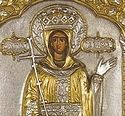

| Previous day | Next day |
| Old Style
September 11
|
Sunday |
New Style
September 24
|
| 16th Sunday after Pentecost. Sunday before the Exaltation of the Cross. Tone 7. | No fast.
|
![]() Afterfeast of the Nativity of the Theotokos.
Afterfeast of the Nativity of the Theotokos. ![]() St. Theodora of Alexandria (490).
St. Theodora of Alexandria (490). ![]() Translation of the relics of Sts. Sergius and Herman of Valaam (1542-1550).
Translation of the relics of Sts. Sergius and Herman of Valaam (1542-1550). ![]() St. Silouan, elder, of St. Panteleimon Monastery, Mt. Athos (1938).
St. Silouan, elder, of St. Panteleimon Monastery, Mt. Athos (1938).
Martyrs Demetrius, his wife Evanthia, and their son Demetrian, at Skepsis on the Hellespont (1st c.). Martyr Ia of Persia and 9,000 martyrs with her (362-364). St. Euphrosynus the Cook, of Alexandria (9th c.). Martyrs Diodorus, Didymus, and Diomedes, of Laodicea (362-364). Glorification of St. Xenia of St. Petersburg, fool-for-Christ (1978). St. John, abbot, of Svyatogorsk Monastery (1970). Synaxis of the Saints of the Svatogorsk Monastery.
Weeping Kazan Icon of the Most Holy Theotokos “Of Kaplunovka.” (1689)
Martyrs Serapion, Cronides, and Leontius, of Alexandria (237). St. Paphnutius the Confessor, bishop in the Egyptian Thebaid (4th c.). St. Deiniol, abbot and bishop, of Bangor, Wales (584). Holy Martyr Theodora of Vasta in the Peloponnese. St. Elias the Cave-dweller, of Calabria (ca. 960).
Repose of the young Elder Melchizedek of Mzensk (1846).
Thoughts for Each Day of the Year
According to the Daily Church Readings from the Word of God
By St. Theophan the Recluse

The Sixteenth Sunday After Pentecost. [II Cor. 6:1-10; Matt. 25:14-30]
The parable about the talents offers the thought that life is a time for trading. That means that it is necessary to hasten to use this time as a person would hurry to a market to bargain for what he can. Even if one has only brought bast shoes, or only bast,[1] he does not sit with his arms folded, but contrives to call over buyers to sell what he has and then buy for himself what he needs. No one who has received life from the Lord can say that he does not have a single talent—everyone has something, and not just one thing; everyone, therefore, has something with which to trade and make a profit. Do not look around and calculate what others have received, but take a good look at yourself and determine more precisely what lies in you and what you can gain for that which you have, and then act according to this plan without laziness. At the Judgment you will not be asked why you did not gain ten talents if you had only one, and you will not even be asked why you gained only one talent on your one, but you will be told that you gained a talent, half a talent or a tenth of its worth. And the reward will not be because you received the talents, but because you gained. There will be nothing with which to justify yourself—not with nobleness, nor poverty, nor lack of education. When this is not given, there will be no question about it. But you had hands and feet. You will be asked, what did you gain with them? You had a tongue, what did you gain with it? In this way will the inequalities of earthly states be levelled out at God’s judgment.
[1] Very inexpensive, unsophisticated items.
Seventeenth Sunday After Pentecost. Sunday Before the Elevation of the Cross. [Gal. 6:11-18; John 3:13-17]
As Moses lifted up the serpent in the wilderness, even so must the Son of Man be lifted up: That whosoever believeth in Him should not perish, but have eternal life. Faith in the Son of God, crucified in the flesh for our sake—is the power of God unto salvation, the living source of vivifying moral aspirations and dispositions, and the receptacle of the abundant grace of the Holy Spirit which abides always in the heart, and of secret inspirations in good time, at the hour of need, sent from above. Faith combines one’s convictions, attracting God’s good will with power from above. Both of these are what make up the possession of eternal life. While this life is kept intact, a Christian is unyielding, because by cleaving to the Lord he is one in spirit with the Lord, and nothing can overcome the Lord. Why do people fall? From weakening of faith. Christian convictions weaken—and moral energy weakens as well. While this weakening occurs, grace is crowded out of the heart, and evil urges raise their head. An inclination toward these urges comes at a convenient hour, and there is a fall. Be a watchful guardian of the faith in everything it encompasses, and you will not fall. In this sense Saint John says that he who is born of God does not sin.
Articles
 Venerable Sergius the Wonderworker of ValaamSaints Sergius and Herman settled on the island of Valaam in 1329. |
 Venerable Herman the Wonderworker of ValaamSaints Sergius and Herman settled on the island of Valaam in 1329. The brethren gathered by them spread the light of Orthodoxy in this frontier land. |
 St. Euphrosynus the Cook, of AlexandriaSaint Euphrosynus the Cook was from one of the Palestinian monasteries, and his obedience was to work in the kitchen as a cook. |
 Holy Hierarch Deiniol, Bishop of Bangor in WalesDmitry LapaSt. Deiniol (the Welsh from of Daniel) lived in the sixth century. He was a descendant of one Celtic ruler in Northern Britain. |








